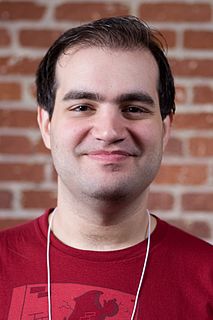A Quote by Fritjof Capra
The structure of the human brain is enormously complex. It contains about 10 billion nerve cells (neurons), which are interlinked in a vast network through 1,000 billion junctions (synapses). The whole brain can be divided into subsections, or sub-networks, which communicate with each other in a network fashion. All this results in intricate patterns of intertwined webs, networks of nesting within larger networks.
Related Quotes
The brain is really hard to see. The whole thing is very large - the human brain is several pounds in weight - but the connections between brain cells, known as synapses, are really tiny. They're nanoscale in dimension. So if you want to see how the cells of the brain are connected in networks, you have to see those connections, those synapses.
There are 100 billion neurons in the adult human brain, and each neuron makes something like 1,000 to 10,000 contacts with other neurons in the brain. Based on this, people have calculated that the number of permutations and combinations of brain activity exceeds the number of elementary particles in the universe.
The brain immediately confronts us with its great complexity. The human brain weighs only three to four pounds but contains about 100 billion neurons. Although that extraordinary number is of the same order of magnitude as the number of stars in the Milky Way, it cannot account for the complexity of the brain. The liver probably contains 100 million cells, but 1,000 livers do not add up to a rich inner life.
The brain is the most complicated organ in the universe. We have learned a lot about other human organs. We know how the heart pumps and how the kidney does what it does. To a certain degree, we have read the letters of the human genome. But the brain has 100 billion neurons. Each one of those has about 10,000 connections.
Neural science, which is the study of the brain, tells us that we have up to one billion brain cells with thousands of branches that communicate with each other much like a complex highway system. The more we attend to something, or the more we engage in certain behaviors, the more those particular cells communicate and the pathways between them deepen. This is how our values, our beliefs, and our motivations are actually formed.
With its hundred billion nerve cells, with their hundred trillion interconnections, the human brain is the most complex phenomenon in the known universe - always, of course, excepting the interaction of some six billion such brains and their owners within the socio-technological culture of our planetary ecosystem!
It is the spread of the good things that vindicates the whole reason we live our lives in networks. If I was always violent to you or gave you germs, you would cut the ties to me and the network would disintegrate. In a deep and fundamental way, networks are connected to goodness, and goodness is required for networks to emerge and spread.


































